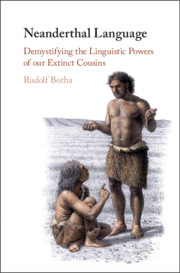Book contents
- Neanderthal Language
- Neanderthal Language
- Copyright page
- Contents
- Figures
- Images
- Acknowledgements
- Copyright Permission for Images
- Part I Preliminaries
- Part II Symbolic Behaviours
- 3 Making and Wearing Personal Ornaments
- 4 Producing Cave Art
- 5 Beautifying Bodies
- 6 Burying the Dead
- 7 Leaping to Language
- Part III Non-symbolic Behaviours
- Part IV Implications
- Notes
- References
- Index
7 - Leaping to Language
from Part II - Symbolic Behaviours
Published online by Cambridge University Press: 26 April 2020
- Neanderthal Language
- Neanderthal Language
- Copyright page
- Contents
- Figures
- Images
- Acknowledgements
- Copyright Permission for Images
- Part I Preliminaries
- Part II Symbolic Behaviours
- 3 Making and Wearing Personal Ornaments
- 4 Producing Cave Art
- 5 Beautifying Bodies
- 6 Burying the Dead
- 7 Leaping to Language
- Part III Non-symbolic Behaviours
- Part IV Implications
- Notes
- References
- Index
Summary
Chapter 7 appraises the language inference. It is the final component of the jewellery inference, the cave-art inference, the body-decoration inference and the deliberate-burial inference. It comprises one step: Certain Neanderthals had symbols → These Neanderthals had language. This inference fails all three soundness conditions. First, the conclusion that certain Neanderthals had language lacks pertinence: the entity central to this conclusion, language, is on the whole not clearly identified and adequately characterised in the literature. That is, language is not distinguished in a principled way from other linguistic entities, including linguistic capacity, language ability, linguistic skill, speech and communication. Second, the inferential step lacks uncontentious grounding: it has not been uncontroversially established that Neanderthals engaged in symbolic behaviours. The inferential step lacks an appropriate warrant: it moves in an arbitrary way from putative cultural symbols that cannot be semantically combined to linguistic signs that can be semantically combined, a distinction drawn in a principled way in the literature. So, the language inference is unsound.
- Type
- Chapter
- Information
- Neanderthal LanguageDemystifying the Linguistic Powers of our Extinct Cousins, pp. 97 - 108Publisher: Cambridge University PressPrint publication year: 2020

